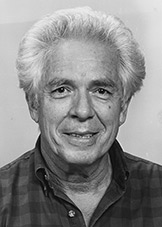Harold Kuhn
| Harold W. Kuhn | |
|---|---|
 |
|
| Born |
July 29, 1925 Santa Monica, California |
| Died | July 2, 2014 (aged 88) New York City, New York |
| Residence | United States |
| Nationality | American |
| Fields | Mathematics |
| Institutions | Princeton University |
| Alma mater | Princeton University |
| Doctoral advisor | Ralph Fox |
| Doctoral students |
James G. MacKinnon Guillermo Owen Richard Stearns |
| Known for |
Hungarian method Karush–Kuhn–Tucker conditions Kuhn poker |
| Notable awards | John von Neumann Theory Prize (1980) |
Harold William Kuhn (July 29, 1925 – July 2, 2014) was an American mathematician who studied game theory. He won the 1980 John von Neumann Theory Prize along with David Gale and Albert W. Tucker. A former Professor Emeritus of Mathematics at Princeton University, he is known for the Karush–Kuhn–Tucker conditions, for Kuhn's theorem, for developing Kuhn poker as well as the description of the Hungarian method for the assignment problem. Recently, though, a paper by Carl Gustav Jacobi, published posthumously in 1890 in Latin, has been discovered that anticipates by many decades the Hungarian algorithm.
Kuhn was born in Santa Monica in 1925. He is known for his association with John Forbes Nash, as a fellow graduate student, a lifelong friend and colleague, and a key figure in getting Nash the attention of the Nobel Prize committee that led to Nash's 1994 Nobel Prize in Economics. Kuhn and Nash both had long associations and collaborations with Albert W. Tucker, who was Nash's dissertation advisor. Kuhn co-edited The Essential John Nash, and is credited as the mathematics consultant in the 2001 movie adaptation of Nash's life, A Beautiful Mind.
Harold Kuhn served as the third president of the Society for Industrial and Applied Mathematics (SIAM).
...
Wikipedia
